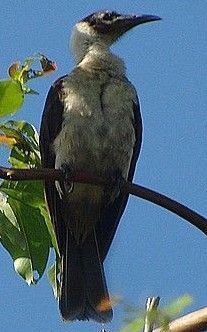A documentary shot by an Iranian asylum seeker in a detention camp was among several Iranian films screened at this year’s London Film Festival, which drew some 200,000 moviegoers to an array of cinemas across the British capital in October.
The documentary “Chauka, Please Tell Us The Time” by Arash Kamali Sarvestani and Behrouz Boochani – which many expected to win a prize – was shot on a mobile phone by Boochani inside the Manus Island detention center in Papua New Guinea. The camp, officially closed on October 31, opened in 2001 to house boat people without visas seeking asylum in Australia. Boochani remains in the camp along with hundreds of detainees who have refused to leave. His film was compiled over many months.
Audio recording of the “Manus Friarbird (Philemon albitorques)” from xeno-canto by John Dumbacher. Genre: Meliphagidae

‘Chauka‘ is a species of bird living on the island, as well as the name given to the solitary confinement unit at the Manus detention center. Co-director Arash Kamali Sarvestani, who lives in the Netherlands, produced the movie, which sheds light on the plight of Iranian asylum seekers and the unimaginable hardships that they endure in the internment camp.
The festival commemorated the late Iranian director Abbas Kiarostami through a posthumous screening of his last feature film “24 Frames.” The film, which was completed by Kiarostami’s son Ahmad, consists of a series of 24 four-and-a-half-minute segments, most of them depicting animals in nature.
The other high-profile Iranian artist honored by the festival was Shirin Neshat. She was in London to present her new movie “Looking For Oum Kulthum” – the story of a female artist who sets out to direct the life story of the legendary Egyptian singer, yet fails to fully capture her essence.

The renowned Iranian actress Golshifteh Farahani starred in Indian director Anup Singh’s “The Song of Scorpions.” She plays a healer curing people who are bitten by desert scorpions. Her character, Nooran, is pursued by an overzealous suitor named Aadam, played by the Indian superstar Irrfan Khan, who starts to terrorize her after she rejects his advances.
Among the other Iranian titles shown at the festival was Ida Panahandeh’s “Esrafil.” It’s the story of Nahid, a woman who lives in a small town and faces stringent social protocols and traditions. The film, which tackles sensitive social issues with restraint, is about a doomed love.
Iranian-French director Maryam Goormaghtigh’s “Before Summer Ends” was screened in the documentary category. An examination of the clash of cultures, it tells the story (using scripted dialogues) of three Iranian young men living in France who embark on a summer road trip before one of them heads back to Iran.
Iranian director Majid Majidi showed “Beyond The Clouds,” his first feature set in India. The film is about a poor brother and sister living in the slums of Mumbai. He is a drug dealer and she a prostitute, yet neither know about the secret life of the other. The pair are seeking justice after the sister is arrested and charged with attempted murder. As in his other films, Majidi aims to illustrate the noble aspects of poverty and the virtues of family.
Finally, two Iranian short films – “Retouch” by Kaveh Mazaheri and “Lunch Time” by Alireza Ghasemi – were selected by the festival organizers. “Retouch” tells the story of a wife who is indifferent to her husband’s death. She conceals her apathy by creating an intriguing daily routine. “Lunch Time” is about a 16-year-old girl who is prevented by the staff at a hospital’s morgue from identifying her mother’s dead body. It is, however, not clear whether the dead woman is actually the young girl’s true mother or not.

